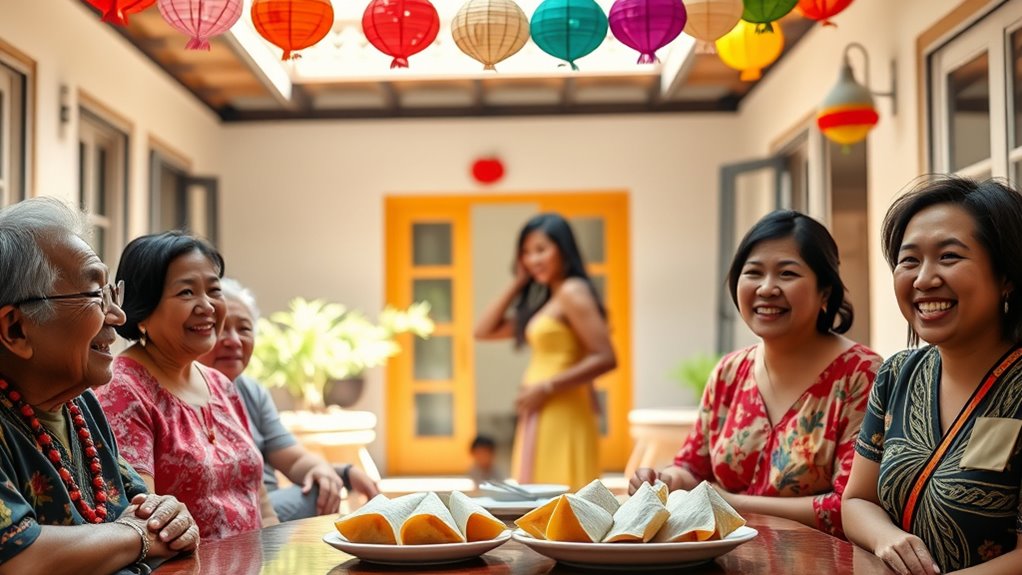In Filipino love stories, extended family plays an essential role in shaping relationships. Your connections with relatives often influence your romantic decisions, as family expectations weigh heavily on love and commitment. Celebrations and shared traditions create a rich backdrop for courtships, while collective wisdom from elders guides your choices. Through love expressed by actions and support, families tightly weave emotional bonds. Discover how these dynamics unfold and impact love narratives throughout Filipino culture.
Key Takeaways
- Extended families often influence romantic decisions, emphasizing the importance of familial approval in love stories.
- Cultural traditions and gatherings reinforce family ties, shaping the narrative of love through shared experiences.
- Family expectations regarding financial support and stability impact relationship dynamics in Filipino love stories.
- The interconnectedness of kinship ties provides emotional support, enriching the romantic journey of the protagonists.
- Conflicts between personal desires and family obligations frequently drive the plot, showcasing the complexities of love within familial contexts.
The Importance of Family Gatherings
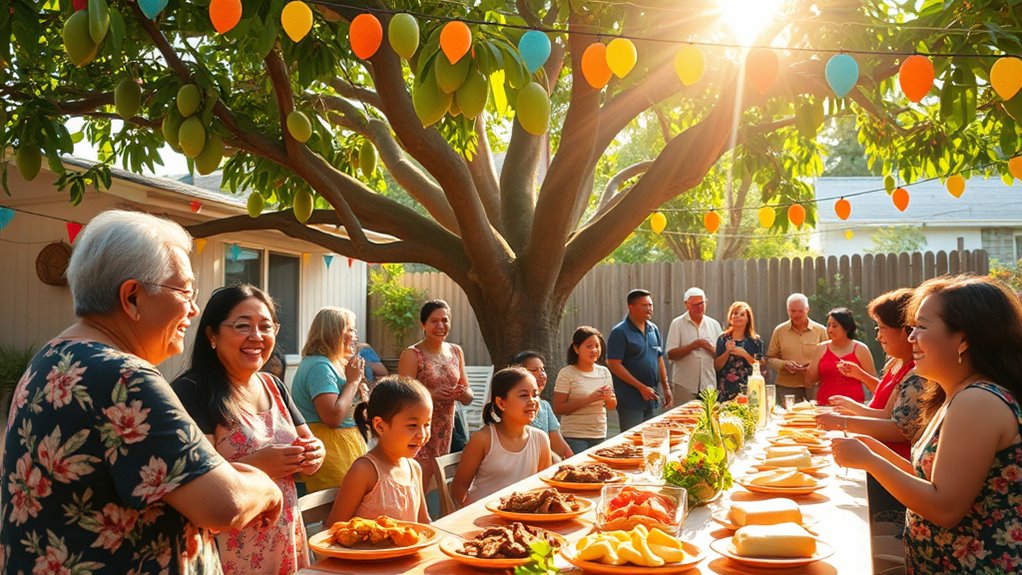
While you may often find yourself caught up in the hustle and bustle of daily life, family gatherings offer an essential opportunity to reconnect and strengthen bonds with your loved ones.
These gatherings allow you to nurture relationships across generations, fostering emotional support and making everyone feel valued. Celebrating together reinforces your family’s identity and cultivates unity among relatives.
The shared experiences during these events create lasting memories that tie you to your family’s history. Plus, being surrounded by extended family enhances your sense of belonging.
Participating in traditional activities, storytelling, and collaborative preparations not only preserve cherished narratives but also instill core values in younger generations, ensuring that your family’s legacy continues to thrive.
Cultural Significance of Extended Families

Family gatherings not only strengthen bonds but also highlight the cultural significance of extended families in Filipino society. You’ll find that the concept of *kapamilya* expands your sense of belonging, connecting you with aunts, uncles, cousins, and even distant relatives.
These kinship ties enhance social solidarity and provide emotional support. With shared responsibilities in childcare and household tasks, extended families foster collective well-being, especially in three-generation households where grandparents play crucial roles.
Celebrations like Noche Buena reinforce these connections, intertwining blood ties and chosen relationships. Additionally, consulting multiple relatives for major life decisions showcases the value placed on collective wisdom, ensuring cultural continuity and a rich Filipino identity that you cherish and uphold throughout your life.
Influence of Family on Romantic Relationships
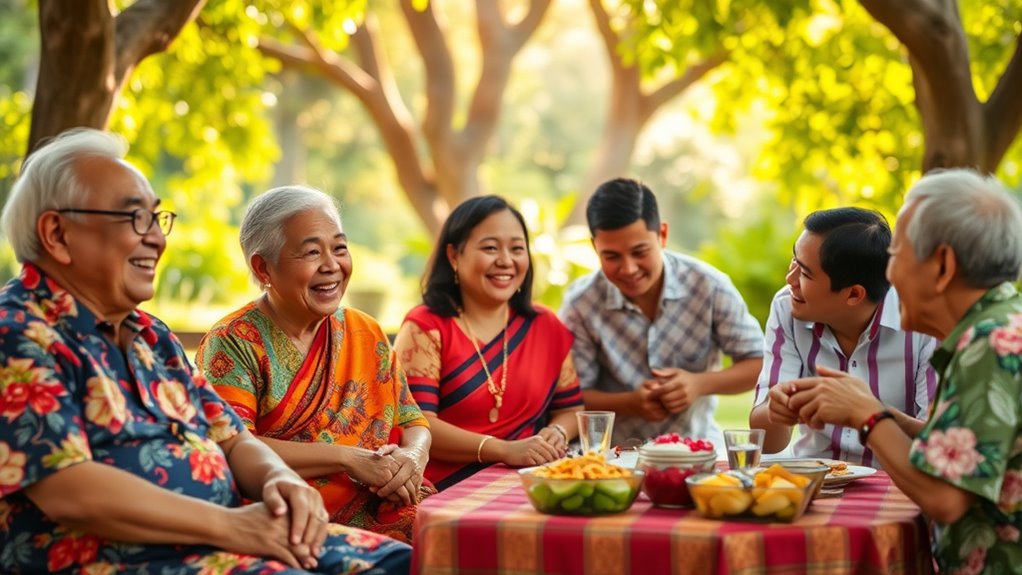
In Filipino culture, the influence of family on romantic relationships is profound, often shaping how you navigate love and commitment. Family expectations weigh heavily, where financial support from partners, especially foreigners, is commonly anticipated.
Living close to extended family can add stress, but integrating into their lives can fortify your relationship. The deep-rooted sense of filial duty means family opinions greatly impact your decisions.
“Pakikisama,” or getting along, is vital for maintaining interpersonal harmony. While family gatherings and celebrations strengthen bonds, disagreements can create strain if not addressed.
Balancing your desires with family expectations is essential, particularly for foreign partners. Understanding these dynamics helps foster a supportive, stable relationship that honors both love and family ties.
Expression of Love Through Actions
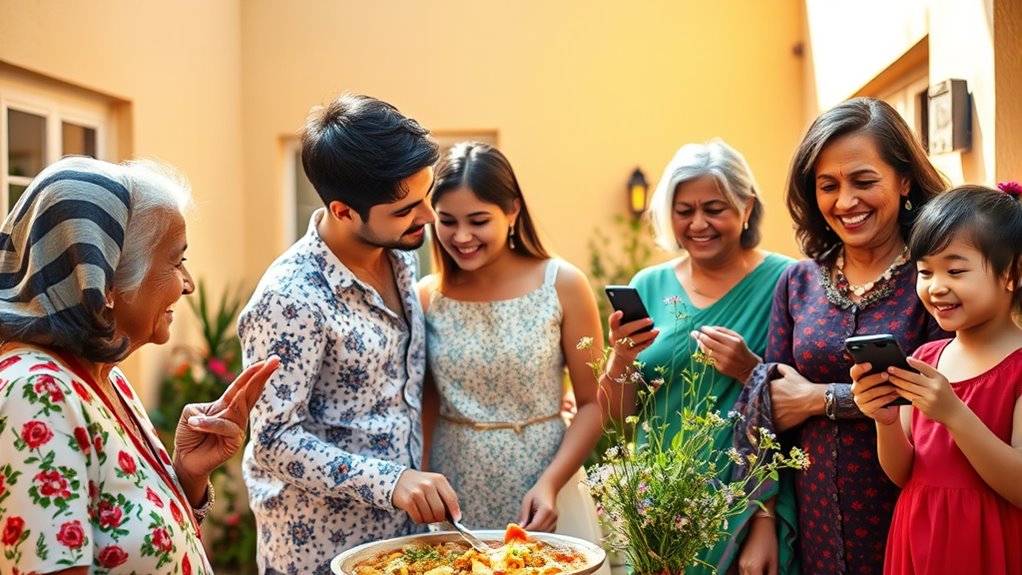
Expressing love through actions is a hallmark of Filipino culture, where tangible gestures often speak louder than words. You might find yourself cooking meals together, sharing food, or lending a hand with household chores. These acts show commitment and care within the family.
Physical touch, like hugging or holding hands, conveys affection without needing to say anything. Respecting and obeying elders reveals your love for family traditions and hierarchy.
Emotional support during tough times is essential, as is participating in community events that extend love beyond the family unit. By engaging in these actions, you foster unity and reciprocity, strengthening bonds and demonstrating that love is woven into everyday life through shared responsibilities and sacrifices.
Traditional Practices Shaping Family Dynamics
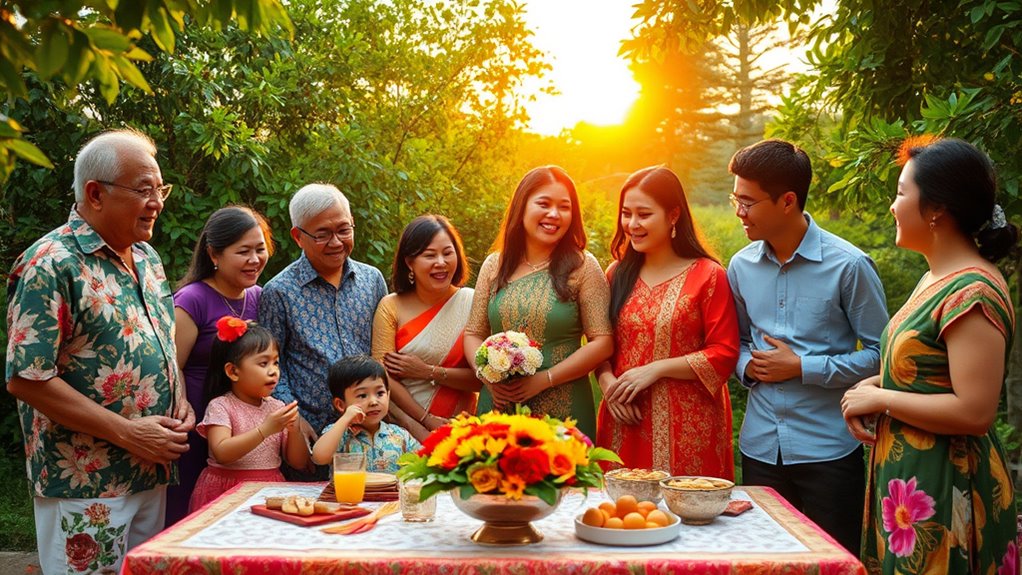
While you navigate the intricate landscape of Filipino culture, traditional practices play an essential role in shaping family dynamics.
You’ll find that strong familial networks extend beyond the nuclear family, creating a rich tapestry of relationships. The concept of *kapamilya* fosters lifelong bonds, stretching the definition of family to include friends and neighbors.
You’ll notice that respect for elders influences key decisions, and shared responsibilities cultivate a sense of community. The principle of *utang na loob* deepens gratitude and loyalty, reinforcing ties during tough times.
Family gatherings, like Noche Buena, highlight these connections, offering spaces for storytelling and shared traditions.
Ultimately, these practices solidify the emotional framework that sustains Filipino families through generations.
Modern Dynamics and Changes in Family Structures
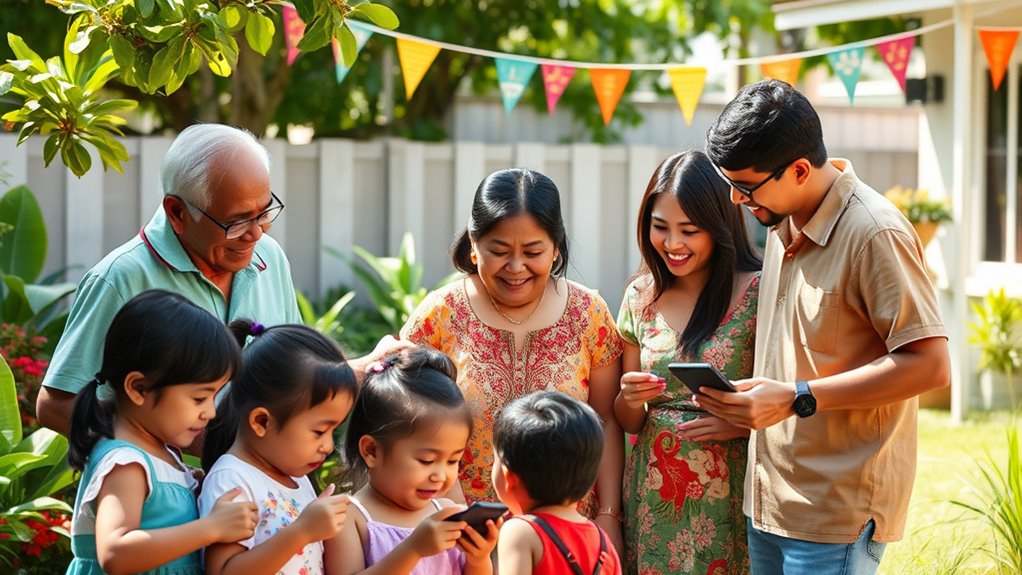
As traditional practices continue to shape family dynamics, modern influences are reshaping how families function today.
You’re likely noticing the rise of nuclear families, especially in urban areas, where household sizes are shrinking. Despite this, many older parents still live with their children, showcasing a blend of old and new.
The rise of nuclear families reflects changing dynamics, yet multi-generational living highlights a beautiful blend of tradition and modernity.
Economic pressures are pushing more families towards dual incomes, changing responsibilities within the household. You might also see an increase in single-headed households due to work migration or marital separation.
Additionally, with the influence of Western culture and evolving gender roles, family values are transforming. Yet, community ties remain strong, proving that while structures change, the importance of family support endures.
The Impact of Extended Family on Love Narratives
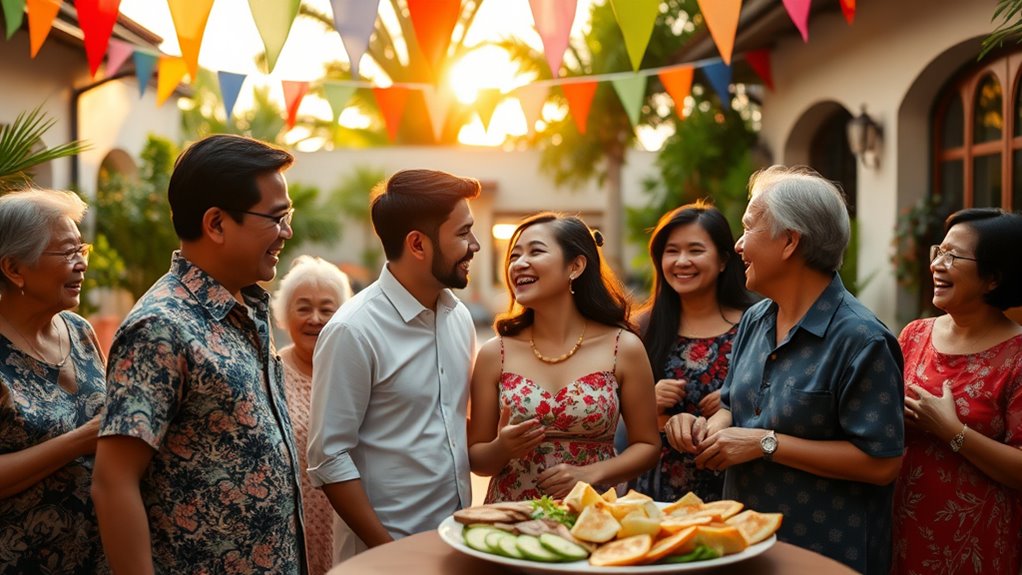
Extended family greatly shapes love narratives in Filipino culture by providing vital support and guidance to couples. Their emotional and financial backing fosters stability and security in relationships.
Cultural traditions are passed down through these familial ties, emphasizing respect and unity, which enriches love stories. When conflicts arise, extended family members often step in to offer advice, helping couples navigate challenges and strengthen their bond.
Family opinions weigh heavily on relationship decisions, as seeking approval is deeply rooted in Filipino values. This close-knit dynamic not only influences interpersonal relationships but also integrates romantic partnerships into the broader community, reinforcing social ties.
Ultimately, the role of extended family is vital in shaping the narratives of love in Filipino culture.
Frequently Asked Questions
How Do Extended Families Influence Marriage Traditions in Filipino Culture?
Extended families considerably influence marriage traditions in Filipino culture.
When you prepare for a wedding, your relatives actively participate in rituals, ensuring that everyone feels involved and respected. They help with customs like pamamanhikan, where family members unite to discuss wedding plans.
You’ll find that their presence during symbolic ceremonies, such as blessing rituals and gift-giving, reinforces the bonds between families, creating a strong foundation for your marriage and fostering unity.
What Role Does Social Media Play in Maintaining Family Connections?
Social media plays an essential role in maintaining family connections by allowing you to share updates and stay in touch with relatives, regardless of distance.
You can easily post about daily activities, significant milestones, or family events, fostering a sense of community.
With platforms like Facebook, you keep everyone informed and engaged, making it easier to organize gatherings and support one another emotionally, even when miles apart.
It truly strengthens those important family bonds.
How Do Family Values Affect Individual Career Choices in the Philippines?
Family values profoundly affect your career choices in the Philippines. You often find yourself influenced by the expectations and opinions of your family, as their input carries significant weight.
Elders, especially grandparents, guide your decisions with their wisdom and life experiences. Financial support from family members can direct your educational paths, while the strong sense of loyalty and cultural identity shapes your professional aspirations, ensuring your choices align with family traditions and values.
Are There Regional Variations in Extended Family Dynamics Across the Philippines?
Yes, there are regional variations in extended family dynamics across the Philippines.
In urban areas, you’ll often find nuclear families due to housing costs and lifestyle changes.
Meanwhile, rural regions typically maintain traditional extended family structures, where siblings and grandparents live close by.
Economic factors and cultural norms also influence these dynamics, creating different family support systems and relationships based on your location and socio-economic background.
How Do Extended Families Support Each Other During Crises or Challenges?
Did you know that nearly 80% of families in crisis turn to their extended relatives for support?
During tough times, your extended family steps up, providing emotional and financial assistance. They share resources, alleviate stress, and offer practical help like caregiving and daily tasks.
Regular communication fosters belonging, while rituals strengthen bonds. This network creates resilience, enabling you to navigate challenges together, ensuring no one feels alone in their struggles.
Conclusion
So, while you might think love stories are all about passionate romance and grand gestures, it turns out that the real plot twist is the extended family lurking in the background. Their gatherings, quirks, and unsolicited advice shape the narrative in ways you never expected. Who knew that a loud aunt could influence your love life more than a swoon-worthy hero? In the end, it’s the family that adds the spice, making your love story a delightful chaos.
